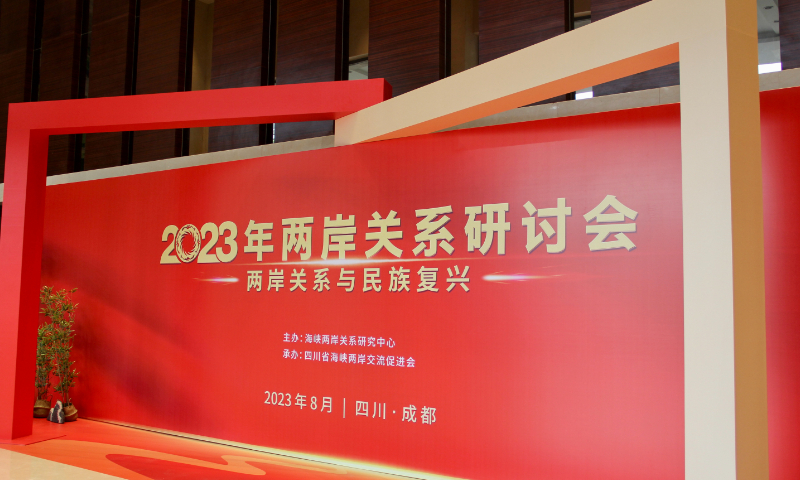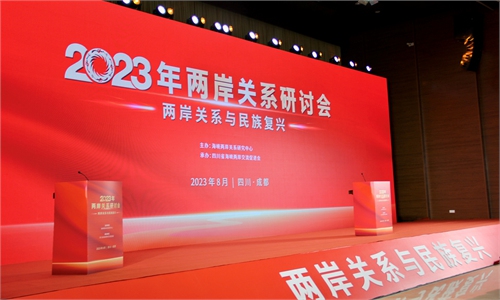Experts call for further cross-Straits integration amid challenges from secessionists, external forces

Photo: Wang Qi/GT
Amid profound changes in geopolitics and constant provocations by Taiwan secessionists, experts and scholars from both sides of the Taiwan Straits on Friday called for further strengthening of cross-Straits people-to-people exchanges and economic and trade cooperation to promote social integration and development on both sides.
Experts from universities and think tanks in the Chinese mainland and Taiwan island exchanged their ideas at a major cross-Straits academic seminar on Friday in Chengdu, Southwest China's Sichuan Province.
The seminar was held after the provocative "transit" through the US of the deputy leader of Taiwan region Lai Ching-te, and amid rising concerns of an escalation of tensions and even a "peace or war" juncture if Lai becomes the next Taiwan regional leader after the 2024 election.
Wei Ai, head of the Cross-Straits Research Center of National Chengchi University in Taiwan, said during the seminar that different from the close cross-Straits interaction when Ma Ying-jeou was in power, after Tsai Ing-wen took office in 2016, cross-Straits relations were deadlocked as the Democratic Progressive Party (DPP) authorities do not recognize the 1992 Consensus and rely on the US.
With the DPP likely to remain in power in 2024, the deadlock is likely to continue. Therefore, cross-Straits exchanges are needed to bypass DPP obstruction, which makes private enterprises and organizations on both sides particularly important.
Echoing Wei, Chi Chun-chen, a senior cross-Straits scholar at Ming Chuan University, told the Global Times that some people in Taiwan are suspicious of the mainland because the DPP controls the media and smears the mainland. It also modifies textbooks to deny Chinese culture. If Lai is elected, there may be more tricks than in Tsai's period in office.
In order to preserve the prospect of peaceful reunification, exchanges between local governments and people on both sides of the Straits need to be further strengthened, Chi said, noting that the mainland can further encourage Taiwan's youth to live and work in the mainland.
Sheng Jiuyuan, director of the Center for Taiwan Studies at Shanghai Jiao Tong University, said that it's vital to promote cross-Straits economic and trade cooperation through non-official means and to form an irreversible, sustainable and people-centered model of cross-Straits economic and trade cooperation.
The two sides of the Straits need to establish more efficient industrial interaction through new cooperation areas, and to constantly increase the well-being of people on both sides in economic and trade cooperation, so as to better consolidate the foundations of cross-Straits people-to-people exchanges, Sheng added.
Cao Xiaoheng, director of The Institute of Taiwan Economy of Nankai University, said that in promoting the institutionalization of cross-Straits economic cooperation and building a cross-Straits common market, the mainland has several advantages, including a huge and growing market, a sound industrial system, a stable business environment, and a large trade volume worldwide.
Cao pointed out that the future focus of cross-Straits cooperation could be on scientific and technological innovation, which is the focus for high-quality development in the mainland.
Liu Xing-ren, an associate professor at Taipei-based Chinese Culture University, told the Global Times on Friday that it is the consensus of Taiwan society that cross-Straits exchanges are beneficial for Taiwan. As the strength of the Chinese mainland has been continuously improving, Taiwan should not be absent from the process of the development of the motherland.
The path of peaceful reunification of the mainland is consistent, despite rising challenges and risks, said Liu. He called on the DPP authorities to give people on the island enough space for cross-Straits communication, and to let the people on both sides of the Straits to jointly decide on the future development.
Li Zhenguang, deputy director at the Institute of Taiwan Studies at Beijing Union University, told the Global Times that the DPP has created many policy obstacles to cross-Straits exchanges and integration. "All we have to do is break its blockade of communication," Li said.
People-to-people exchanges between the two sides are the basis for integrated development. To deepen integration and development is actually to push cross-Straits relations onto the track of peaceful reunification, so as to avoid compatriots on both sides of the Taiwan Straits harming each other, Li added.


